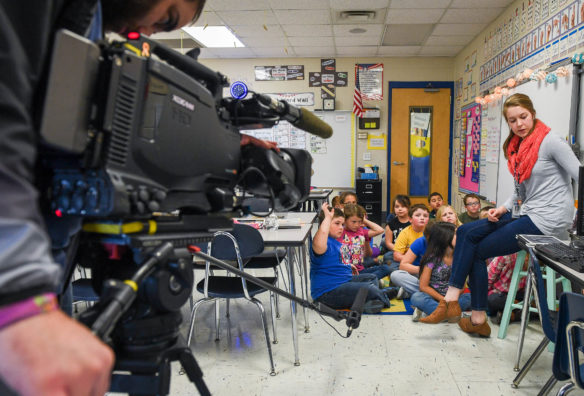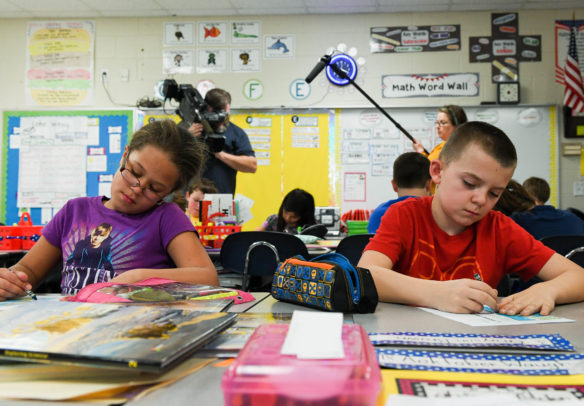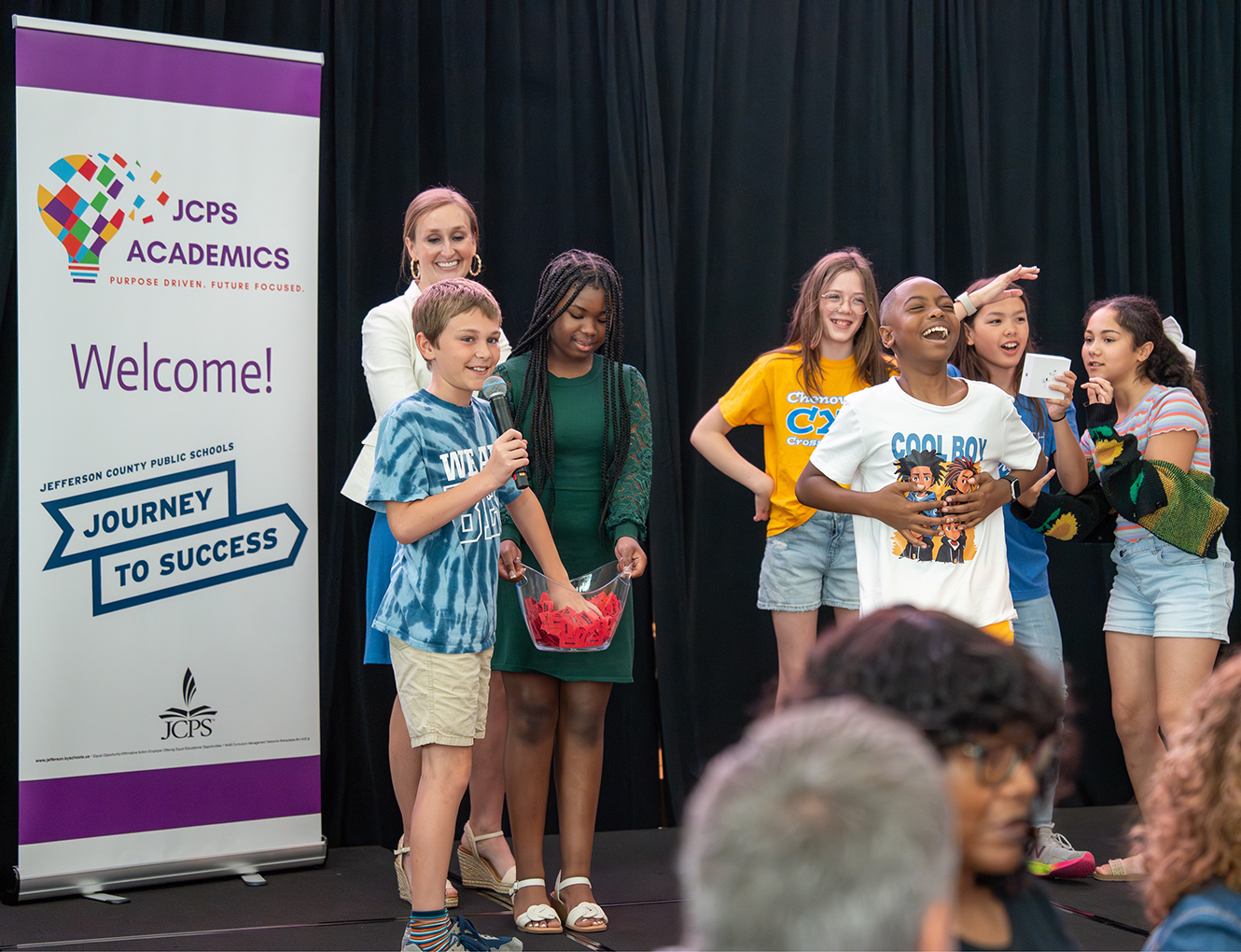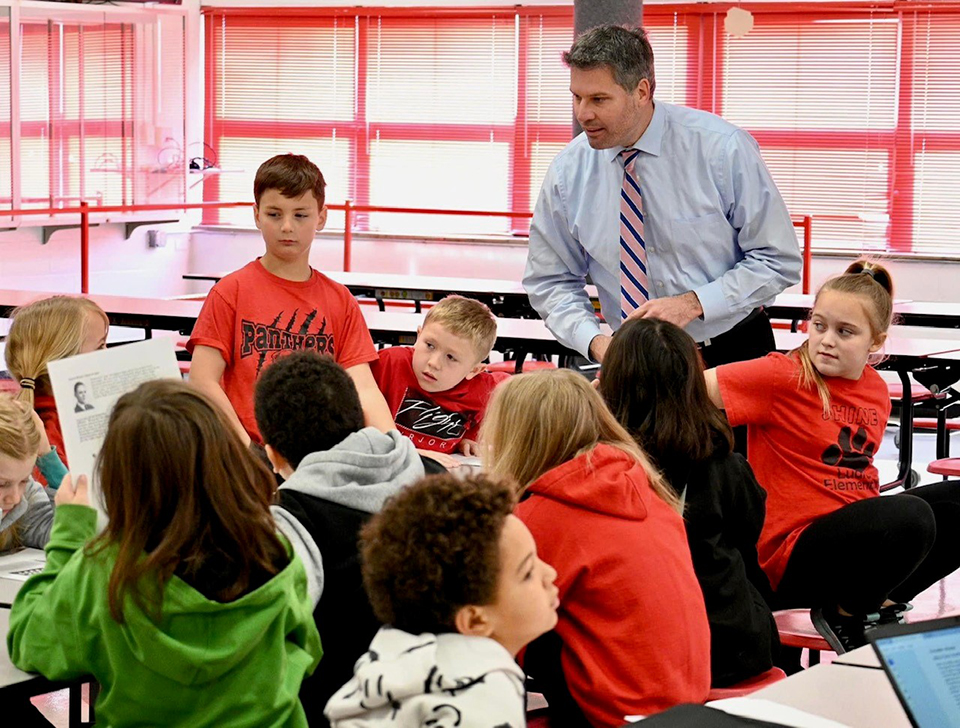
Chris Check films Sarah Burns, a 2nd-grade teacher at North Washington Elementary (Washington County), for KET as she teaches her students about volcanoes and how they change the landscape.
Photo by Bobby Ellis, March 21, 2017
By Brenna R. Kelly
Brenna.Kelly@education.ky.gov
Second-graders might not know that matter can change, but they know candy melts.
That’s why Washington County teachers Amy Noel and Sarah Burns are using a candy as way to help their students understand changes in matter.
“We are going to pretend that it’s going to be a really hot October for Halloween. So, what’s the best kind of candy that Ms. Jenkins can buy that won’t melt or become sticky,” Burns said.
Students will look at a graph depicting the different types of candy and what happens when it’s heated.
“They will make a claim, such as ‘I think this is the best candy because …’ and then they will have to explain their thinking,” Burns said.
The exercise is just one of the many performance tasks that 12 Washington County teachers are developing as part of a grant designed to improve science instruction and assessment across the state and nation.
The $128,000 grant is from the Council of Chief State School Officers (CCSSO) and administered by the Kentucky Department of Education (KDE). It is funding the implementation of new tools to help the teachers provide better feedback to students and to enhance their ability to adjust instruction in response to student learning. The results will be shared in both Kentucky and across the nation through PBS Learning Media.
The 12 teachers are using formative assessment practices in science classes from kindergarten to 12th grade in hopes of improving science instruction. Formative assessment allows teachers to see what students are learning as they learn it so teachers can modify their instruction or clear up misconceptions as needed.
To enhance their science instruction, the teachers are using a tool called the Formative Assessment Rubrics, Reflection and Observation Protocol (FARROP) to help them improve feedback to students and enhance their ability to adjust instruction quickly. Though the FARROP includes 10 dimensions, Washington County teachers are using the first three – learning goals, criteria for success, and tasks and activities that elicit evidence of student learning.
Laying out the learning goals and success criteria for each lesson has helped the teachers focus their lessons on what’s really important, Noel said.
“It sort of helps me to make sure I’ve covered what they need to know by the end of the lesson,” said Noel, who teaches at Washington County Elementary. “It just makes you more aware.”
The success criteria also help the students because they aren’t left guessing what’s important, said Burns, who teaches at North Washington Elementary.
“It’s the intentionality of making sure they know exactly what you expect and what they should be able to do to get there,” she said.
The performance activities, or classroom embedded assessments, allow student to show that they’ve met that success criteria, said Rae McEntyre, KDE science consultant and grant administrator.
“The key is to identify whatever your learning goals are and then think, ‘How will I know if the students have met that learning goal or goals?” she said. “Then, ‘What can you provide or develop that will show that your students have met those goals?”

Neveah VanCleave, left, and Grayson Brown work on flip-books as their 2nd-grade class if filmed by KET for its form and assessment videos.
Photo by Bobby Ellis, March 21, 2017
At a meeting earlier this year, 12 teachers spread out in the Washington County High School Library to work on creating performance tasks as McEntyre and Cherry Boyles, Washington County’s director of instruction, wandered the room offering advice.
“When you give the classroom embedded assessment, it’s formative,” Boyles told the teachers. “You are eliciting evidence from the students and you respond by making the necessary adjustments to your instruction. Whatever the evidence tells you about student learning, that informs your next step.”
As part of the grant, KET filmed the teachers using formative assessment practices, including the performance tasks in their classes. The videos will be available on PBS Learning Media.
The teachers also will create learning guides to go along with the videos, including lesson plans, sample tasks and examples of student work.
“We want Washington County and their teachers to be the purveyors of formative assessment across the state,” McEntyre said.
The performance tasks also could be used as part of the state’s new science assessment system, which is being field tested this spring. The assessment system has three parts – classroom-embedded assessments; through-course tests, which are assessments are given throughout the year; and state summative assessments.
The teachers say working on the grant has allowed them to dig deeper into the Kentucky’s Academic Standards for Science, which were implemented in 2014.
“It’s made me think about what I’m teaching and how I’m teaching it, how I’m presenting the standards to the kids,” said 3rd-grade teacher Ellie Campbell. “And being in this group and discussing different ideas and the things that we have tried has been helpful too.”
Seventh- and 8th-grade science teacher Erica Baker said participating in the project has made her look more closely at the standards to make sure her learning goals and success criteria are standards-based.
“Another thing I noticed with my students, it seems like it’s clearer to them to be able to see where I’m wanting them to go and the whole progression of the unit,” said Baker, who teaches at North Washington. “And it’s also helped me see, by doing some formative assessments along the way, what we are missing out on so I can try to clear up those misconceptions before we get too far.”
The formative assessment practices the science teachers are learning have now spread to other subject areas, Boyles said.
“We hadn’t really planned for that to happen, but as we started using the tool with teachers in science, we realized we had some professional implementation gaps. Later, it became evident that those gaps were not just in science, they were across the board,” she said.
Washington County teachers are now using the first three dimensions of the FARROP in English, social studies, science and mathematics.
“Even our special education teachers are now using it,” she said. “Right now it’s mainly our teacher leaders from those other areas who are working through this self-reflection process. Our plan is that over the summer and into next year we will scale that across the district.”
MORE INFO…
Rae McEntyre Rae.McEntyre.@education.ky.gov
Cherry Boyles Cherry.Boyles@washington.ky.gov
Previous coverage: “Perfecting formative assessment in science”






Leave A Comment